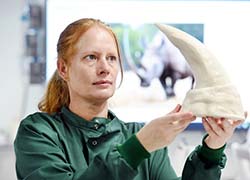Centenary leads to renewed interest in wartime writer
As the centenary of the First World War approaches, the literary works which first captured the shattering experiences of the trenches are attracting renewed attention.
For many, poets are the more familiar First World War writers, but recent years have seen a resurgence of interest in novelists such as Ford Madox Ford (1873–1939), now recognised as a major presence in early twentieth-century literature.
The recent widely-acclaimed television adaptation of Ford's novel Parade's End, based in pre-war and wartime England and France and starring Sherlock actor Benedict Cumberbatch, has helped to create a whole new audience for the writer's work.
Also reflecting the surge of interest in Ford is the International Ford Madox Ford Studies book series, now in its thirteenth volume. Teesside University academic Dr Rob Hawkes has co-edited the latest collection of essays in the series, focusing specifically on Parade’s End.
Dr Hawkes, Senior Lecturer in English Studies, said: 'It's a great time to revisit Ford's work, with the centenary of the First World War and the new interest we’re seeing in Ford following the television adaptation of Parade's End.
'Ford joined the army in 1915 and was injured at the Somme in 1916. He was based in Redcar for most of 1918, the final year of the war, during which he also spent time in Eston. He went on to model Parade's End's main character Christopher Tietjens on his friend Arthur Marwood and based Groby, the Tietjens country estate in the novel, on Marwood’s family home Busby Hall in Carlton-in-Cleveland.'
Dr Hawkes added: 'I was first drawn to Ford's work by his experimental writing style and technique and he’s increasingly seen as a major modernist writer.
'As well as writing novels, Ford was a prolific memoirist, a poet, and the editor of two important modernist magazines: the English Review in London from 1908 to 1910 and later the transatlantic review in 1920s Paris. He was known for publishing new writers, giving D. H. Lawrence his first break in the English Review and publishing Hemingway and Jean Rhys in the transatlantic, alongside established figures such as James Joyce.
'Ford knew and was friends with many writers from the modernist period and since then, novelists from Graham Greene to AS Byatt and Julian Barnes have recognised the value of his work. Anthony Burgess described Parade’s End as 'the finest novel about the First World War', Samuel Hynes has called it 'the greatest war novel ever written by an Englishman', and John N Gray described it as 'possibly the greatest 20th-century novel in English'.'
This latest edition in the International Ford Madox Ford Studies series, which is published annually by the Ford Madox Ford Society, was edited by Dr Hawkes and Dr Ashley Chantler of the University of Chester and includes fifteen essays by both established experts and new scholars.
Dr Hawkes said: 'The Ford Madox Ford Society conference in 2012, which I organised with Dr Chantler, was attended by delegates from all over the world and included a public Q&A session with Parade's End's director Susanna White, along with Rupert Edwards, the producer/director of the BBC's Culture Show Special 'Who on Earth was Ford Madox Ford?' 'Our conference coincided with the broadcast of the final episode of Parade's End and the public event attracted a really wide audience, from renowned scholars and others familiar with Ford's work, to those completely new to Parade’s End, including Benedict Cumberbatch fans who came along to find out more after seeing the television adaptation.'
More information on the Ford Madox Ford Society
 Wildlife expert puts Teesside University research in the
...
Wildlife expert puts Teesside University research in the
... Teesside University students creating AI controlled
...
Teesside University students creating AI controlled
... Teesside academic helps set the standard for Anthropology
Teesside academic helps set the standard for Anthropology